
Journal of Social Work Practice in the Addictions
Scope & Guideline
Advancing the science of addiction recovery.
Introduction
Aims and Scopes
- Substance Use Disorders and Treatment Modalities:
The journal addresses various aspects of substance use disorders, including treatment methodologies such as medication-assisted treatment, cognitive-behavioral therapy, and harm reduction strategies, aiming to improve recovery outcomes. - Family and Community Dynamics in Addiction:
A core area of focus is the role of family and community support in addiction recovery, exploring how family dynamics, community resources, and social support systems contribute to treatment success. - Cultural and Socioeconomic Considerations:
The journal emphasizes the importance of cultural competence and understanding socioeconomic factors that influence substance use and treatment outcomes, particularly among marginalized populations. - Interdisciplinary Approaches to Treatment:
It promotes interdisciplinary collaboration, integrating perspectives from psychology, public health, and social work to address complex addiction issues and develop comprehensive treatment strategies. - Emerging Trends and Issues in Addictions:
The publication explores contemporary issues such as the opioid crisis, the impact of COVID-19 on substance use, and the evolving landscape of addiction treatment, ensuring relevance to current societal challenges.
Trending and Emerging
- Impact of COVID-19 on Substance Use:
A growing body of research focuses on the effects of the COVID-19 pandemic on substance use patterns, treatment access, and the mental health of individuals in recovery, highlighting the urgency for adaptive interventions. - Trauma-Informed Care:
There is an increasing emphasis on trauma-informed approaches in addiction treatment, recognizing the profound impact of trauma on substance use disorders and the necessity for sensitive, integrated care. - Peer Recovery Support:
The role of peer recovery coaches and community support networks is gaining prominence, with research highlighting their effectiveness in enhancing recovery outcomes and fostering community resilience. - Integrated Care Models:
Emerging studies advocate for integrated care models that combine mental health and substance use treatment, reflecting a holistic understanding of recovery and health. - Culturally Responsive Practices:
Research exploring culturally tailored interventions for diverse populations, including indigenous communities and marginalized groups, is increasingly featured, addressing the need for inclusivity in addiction treatment.
Declining or Waning
- Traditional Abstinence-Only Approaches:
There is a noticeable decline in papers advocating solely for abstinence-based treatment methods, as the field increasingly recognizes the value of harm reduction and integrated approaches. - Generalized Substance Use Education:
Research focusing on broad educational interventions without specific contextual application appears to be waning, as there is a shift towards targeted interventions that address specific populations and their unique needs. - Pharmacological Treatments without Integrated Support:
Studies that focus solely on pharmacological treatments for substance use disorders, without considering the importance of psychosocial support and integrated care, have become less common. - Stigmatization of Substance Users:
While stigma remains a relevant topic, the frequency of papers addressing stigma in isolation has decreased, with more emphasis now placed on systemic solutions and community-level interventions. - Historical Perspectives on Substance Use:
Research centered on historical analysis of substance use patterns is less prevalent, as current research trends lean more towards contemporary issues and real-time data analysis.
Similar Journals
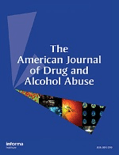
AMERICAN JOURNAL OF DRUG AND ALCOHOL ABUSE
Empowering Scholars with Insights into Addiction DynamicsAmerican Journal of Drug and Alcohol Abuse is a highly regarded publication in the field of substance abuse research, published by Taylor & Francis Inc. With its inception in 1974, this journal has become an essential resource for scholars and practitioners interested in clinical psychology, psychiatry, and the multifaceted issues surrounding drug and alcohol use. It holds a notable Q2 ranking in Clinical Psychology, Medicine (miscellaneous), and Psychiatry and Mental Health, emphasizing its impact and relevance in these domains. The journal's 2023 Scopus rankings further highlight its standing, placing it in the top quartile of publications with established readership and citation metrics. Researchers and students can benefit from its comprehensive articles that delve into the complexities of substance use, treatment methodologies, and the socio-psychological underpinnings of addiction. Whether you seek to access cutting-edge studies or contribute to ongoing discourse in the field, the American Journal of Drug and Alcohol Abuse serves as a vital hub for knowledge dissemination and scholarly engagement.
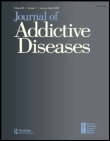
JOURNAL OF ADDICTIVE DISEASES
Uncovering Innovations in Addiction StudiesJOURNAL OF ADDICTIVE DISEASES, published by ROUTLEDGE JOURNALS, TAYLOR & FRANCIS LTD, serves as a pivotal platform for researchers, clinicians, and students in the realms of clinical psychology, psychiatry, and addiction studies. With a distinguished history dating back to its inception in 1991, this journal spans critical research developments with its current scope covering converged years from 2018 to 2024, ensuring a robust repository of knowledge. Notably, it holds a respectable impact factor and is categorized in Q2 quartiles across several disciplines including Clinical Psychology, Medicine (miscellaneous), and Psychiatry and Mental Health for 2023, reflecting its impactful contributions to the scientific community. Despite the journal not currently offering Open Access, it remains highly ranked, occupying positions in the top percentiles of Scopus rankings. This journal emphasizes the importance of disseminating high-quality research focused on addictive behaviors and diseases, thereby addressing vital clinical and public health challenges.

Substance Abuse
Elevating the understanding of complex substance use issues.Substance Abuse is a premier scholarly journal published by SAGE Publications Inc, dedicated to advancing the understanding and treatment of substance use disorders. With an established presence from 1995 to 2023, the journal boasts an impressive Q1 ranking in both Medicine (miscellaneous) and Psychiatry and Mental Health, positioning it among the top tier of academic publications in these fields. Researchers and professionals will find its articles, which are grounded in rigorous empirical studies and innovative interventions, essential for addressing the complex and multifaceted nature of substance abuse. Although not an open access publication, Substance Abuse maintains a commitment to sharing valuable insights and findings, making it a vital resource for those looking to enhance their knowledge and practice. Located in Thousand Oaks, CA, this journal serves as a critical forum for international dialogue and research dissemination, ensuring that current trends and challenges in substance use are thoughtfully examined and discussed within the academic community.
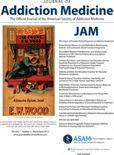
Journal of Addiction Medicine
Unveiling Breakthroughs in Addiction StudiesWelcome to the Journal of Addiction Medicine, a premier academic resource devoted to the field of addiction studies, published by LIPPINCOTT WILLIAMS & WILKINS. Since its inception in 2007, this esteemed journal has become a leader in disseminating groundbreaking research, with impressive rankings in the Q1 quartile across key disciplines such as Medicine (Miscellaneous), Pharmacology (Medical), and Psychiatry and Mental Health, reflecting its significance in the scholarly community. With an ISSN of 1932-0620 and an E-ISSN of 1935-3227, it caters to a diverse audience of researchers, clinicians, and students seeking to expand their understanding of addiction medicine. The journal's articles are primarily published in a non-open access format, ensuring high-quality research is accessible through institutional subscriptions. With a Scopus ranking that positions it within the top tiers of several relevant categories, the Journal of Addiction Medicine is essential for anyone committed to advancing knowledge in the field and addressing the complexities surrounding addiction.
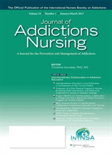
Journal of Addictions Nursing
Exploring New Frontiers in Mental Health and AddictionThe Journal of Addictions Nursing, published by Lippincott Williams & Wilkins, serves as a pivotal resource in the field of psychiatric and mental health nursing. With an ISSN of 1088-4602 and an E-ISSN of 1548-7148, this esteemed journal has been dedicated to advancing the knowledge and practice of addiction nursing since its inception in 1989. As of 2023, it ranks in the Q3 category of psychiatry and mental health, highlighting its significance amidst its peers. The journal provides a platform for the dissemination of original research, reviews, and clinical practices that address the complexities of addiction treatment and care. While it currently does not offer open access options, its valuable insights are accessible to practitioners and researchers committed to improving patient outcomes. With content spanning from 1989 to 2024, the journal continues to shape the discourse in this vital area of nursing, making it an essential read for professionals and scholars aiming to stay at the forefront of addiction nursing and intervention strategies.
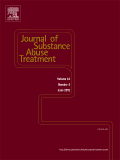
JOURNAL OF SUBSTANCE ABUSE TREATMENT
Connecting Evidence to Effective Treatment StrategiesJOURNAL OF SUBSTANCE ABUSE TREATMENT, published by Pergamon-Elsevier Science Ltd, is a leading peer-reviewed journal that spans a wide range of topics related to substance abuse and addiction treatments. With an impressive impact factor, this esteemed journal ranks in the Q1 quartile across multiple disciplines including Clinical Psychology, Medicine (miscellaneous), and Psychiatry and Mental Health, making it a vital resource for researchers and practitioners alike. Covering convergence years from 1984 to 2023, it publishes cutting-edge research that informs treatment methodologies and policy development in the field of substance abuse. With access options that adapt to both traditional and modern academic needs, the journal seeks to advance the understanding and effectiveness of substance abuse treatment through comprehensive studies and innovative approaches. Be part of a global dialogue that shapes the future of addiction treatment by engaging with the latest findings and expert analyses that help bridge the gap between research and clinical practice.
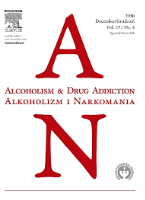
Alkoholizm i Narkomania-Alcoholism and Drug Addiction
Illuminating the path to recovery and understanding.Alkoholizm i Narkomania - Alcoholism and Drug Addiction is a prominent peer-reviewed journal published by the Institute of Psychiatry and Neurology, Department of Studies on Alcoholism in Warsaw, Poland. Renowned for its commitment to advancing the fields of addiction research and mental health, this journal disseminates critical findings regarding the prevention, treatment, and societal implications of alcoholism and drug addiction. Since becoming Open Access in 2017, it ensures that researchers, professionals, and students from across the globe have unrestricted access to valuable resources and emerging studies within this vital area of public health. The journal emphasizes innovative methodologies and interdisciplinary approaches, inviting contributions that explore the complex interplay of psychological, social, and biological factors influencing addiction. By fostering a collaborative and inclusive scholarly community, Alkoholizm i Narkomania aims to contribute significantly to the understanding and resolution of addiction-related challenges worldwide.

Substance Abuse and Rehabilitation
Connecting researchers and practitioners in the fight against substance abuse.Substance Abuse and Rehabilitation, published by DOVE MEDICAL PRESS LTD, is a leading open-access journal dedicated to the study and treatment of substance abuse and related rehabilitation practices. With its ISSN 1179-8467, this journal provides a vital platform for researchers, clinicians, and students to disseminate their findings and insights in a field increasingly relevant to public health. Since becoming open access in 2010, the journal has enhanced its reach, allowing for a broader audience to engage with cutting-edge research and reviews that address the complexities of substance abuse disorders. The journal aims to foster innovation and interdisciplinary collaboration by publishing high-quality peer-reviewed articles that cover a wide range of topics, including addiction therapy, policy implications, and the social determinants of substance use. As a vital resource within the realm of addiction research, Substance Abuse and Rehabilitation plays a crucial role in driving forward knowledge and practices that can improve outcomes for individuals and communities affected by substance use issues.
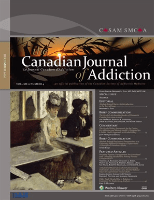
Canadian Journal of Addiction
Advancing the discourse on addiction.Canadian Journal of Addiction is a leading platform dedicated to advancing the understanding of addiction and its multifaceted impacts on individuals and society. Published by LIPPINCOTT WILLIAMS & WILKINS, this journal aims to foster rigorous research and discussion in the field of addiction studies, contributing significantly to the intersection of psychiatry and mental health. With its ISSN 2368-4720 and E-ISSN 2368-4739, the journal is indexed in Scopus and has been categorized in the Q3 quartile for 2023, reflecting its emerging influence amongst peers. The Canadian Journal of Addiction facilitates a vital exchange of ideas and findings, crucial for researchers, practitioners, and students alike, addressing pressing issues related to addiction through innovative studies and insightful reviews. Subscribers and readers benefit from the latest findings as they navigate through the dynamic landscape of addiction research, enriching both academic knowledge and practical applications.
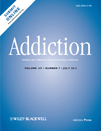
ADDICTION
Exploring the complexities of addiction and recovery.ADDICTION, published by Wiley, is a highly regarded academic journal that serves the vibrant fields of Medicine and Psychiatry and Mental Health. With an impressive impact factor reflective of its significance—ranking in the top 8% and 7.5% of its categories respectively—this journal is esteemed for its rigorous peer-reviewed research which spans a wide array of topics related to addiction, including pharmacology, prevention, and treatment modalities. Since its inception in 1993, ADDICTION has continually provided a platform for innovative research, shaping the discourse and influencing clinical practices worldwide. This journal, based in the United Kingdom at a prestigious location in Hoboken, NJ, stands as a beacon for researchers, practitioners, and students alike, committed to advancing understanding and strategies to combat addiction-related challenges. Although it is not an Open Access publication, the journal's contribution to the field remains invaluable, ensuring that cutting-edge findings are disseminated widely among professionals dedicated to improving mental health outcomes.